Living in a tiny apartment doesn’t mean you can’t benefit from feng shui design principles. In fact, there are many ways to apply feng shui principles to a smaller apartment layout in order to create a better living space.
In this blog post, we will discuss some of thse best tips for creating good apartment feng shui. We’ll also provide some helpful tips on how to make the most of a small apartment layout!
Feng shui principles can be applied to any space big or small. Some of those principles such as energy flow and balance when applied to a smaller living space, can help you create a better space and one that feels open, airy, and harmonious. So keep reading to see how you can achieve this!
What Is Feng Shui?
Feng shui concepts are derived from an ancient Chinese traditional practice that promotes creating good energy between individuals and their surrounding environment. In fact, this New York Times article on the subject, bolsters that concept that your living spaces directly affect your energy. Since we’re big on small space decorating on this blog, it’s important to recognize that even the tiniest room can benefit from these practices.
When it comes to decorating and arranging a small apartment, keep in mind that the way that you arrange your furnishings in your space can make all the difference in the world according to feng shui teachings. So while you may be wondering how to decorate a 500 sq ft apartment, feng shui methods can give you some guidance.
What Are The 5 Elements of Feng Shui:
1.wood
2. fire
3.earth
4.metal
5.water
The earth element in feng shui is representative of strength and stability. Metal is an element that is synonymous with clarity, precision, focus and works in harmony with prosperity and health as well. Lastly the water element symbolizes abundance, calm energy, wisdom, reflection and the flow of life.
Adding the various elements of feng shui to a living space can not only help create balance in the space, but also transform the atmosphere and create harmony. The wood element in feng shui represents health, prosperity, family and wealth. Also a natural earth element, wood has a connection to nature. Fire represents passion and expression in a space and in fact, amplifies that life force as it feeds the wood element.
Really great interior design and space planning actually incorporate feng shui methods. According to QC Design School there are 5 important principles to remember in Feng Shui:
– Maximize natural light to create a feeling of openness.
– Keep the space clean and clutter-free.
– Use furniture that is proportional to the size of the room.
– Place furniture in a way that allows for easy flow of energy throughout the space.
– Add plants and greenery to purify the air and create a feeling of life.
How Can Feng Shui Principles Help Smaller Living Spaces?
Feng shui principles can be applied to any room and living space, no matter the size. When arranging furniture in a smaller living space, it is important to ensure that there is a balance between Yin and Yang energy. To achieve this, you should consider the floor plan of the living space as well as the placement of furniture items.
Feng shui principles can be applied to smaller living spaces in order to create balance and harmony. For example, having a canopy bed with traditional feng shui features such as silk curtains or hanging crystals sets the tone for an inviting atmosphere that is both luxurious and calming. Additionally, furniture arrangement should be carefully planned in order to promote positive good energy.
Here are the best areas to feng shui your home.
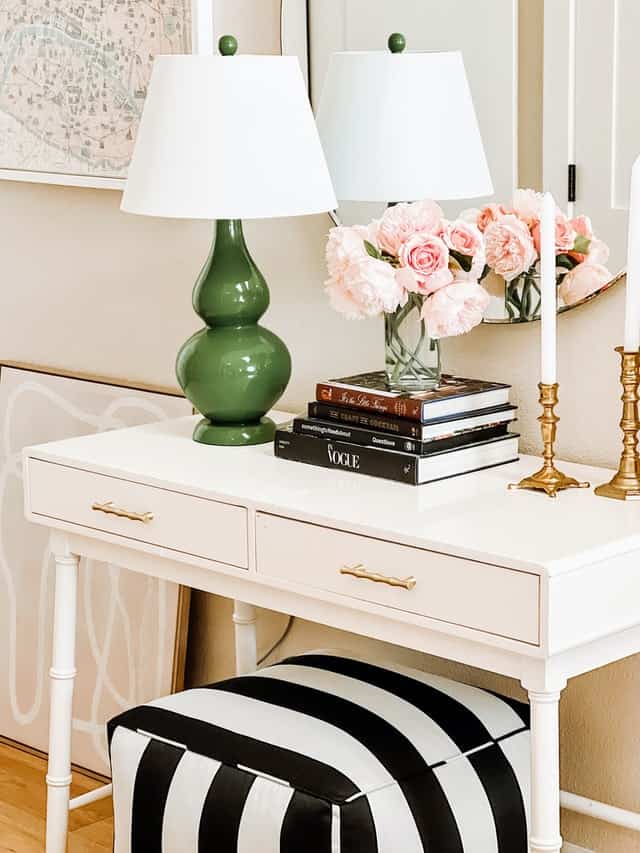
Entryway– The entryway to your home is very important in feng shui. It’s the immediate access of (Chi) energy into your home. This is the first and last area that you’ll see when coming in through your front door and leaving your home.
It’s important to make sure that this space is well-lit, clean, and organized. Eliminate any visible clutter. Make sure the space is organized and everything has a place. If you need tips on decorating your entryway take a look at our post Get Inspired With These Small Entryway Ideas.
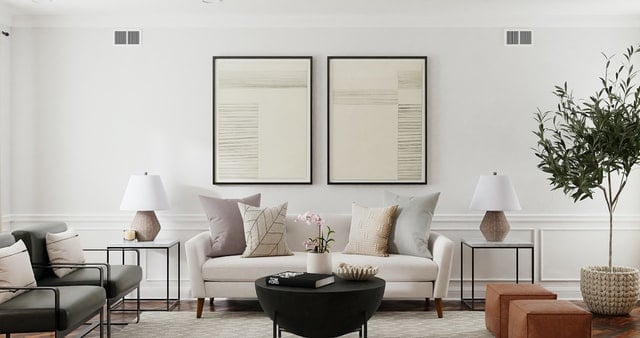
Living Room– The living room is one of the most essential rooms in a feng shui home. The ability to bring in as much natural light as feasible is important for generating positive energy. Keep windows and blinds open to enhance natural light and stale energy flow out.
It’s important to build conversation areas or clusters of sitting so that the energy flows freely. Use your coffee table as a central piece of furniture in which conversation happens around. Incorporating a lot of plant life in your space is also great for bringing in that feeling of vitality.
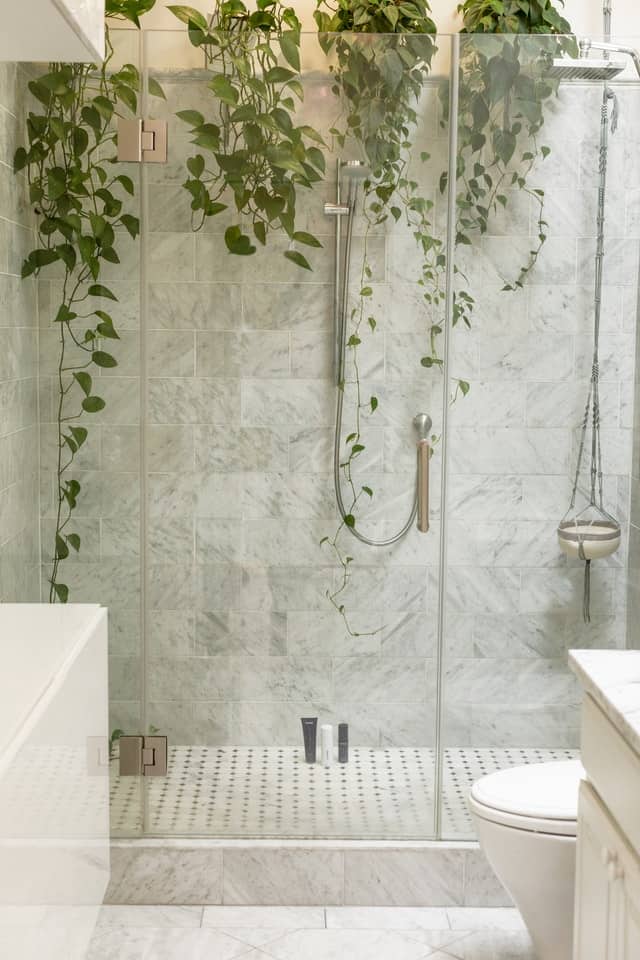
Bathroom– In feng shui bathrooms have bad energy. It’s a place where all your impurities and waste are eliminated. Because of this, it’s important to keep the bathroom clean and clutter-free. It’s also important to make sure that the energy isn’t then released into the rest of the space. Keep bathroom doors closed always.
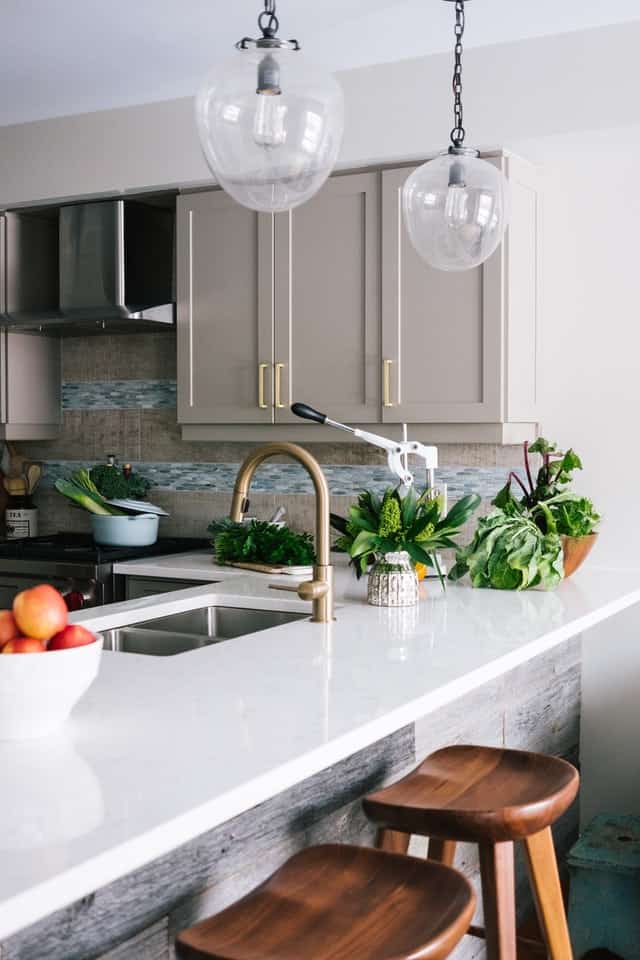
Kitchen – Make sure there is really great lighting in this space. Pendant and overhead lighting are great for keeping the space well lit. Keep countertops clear and free as well as keeping the space around the kitchen clear. Decorative items like bowl to store fruit brings an energy of abundance.
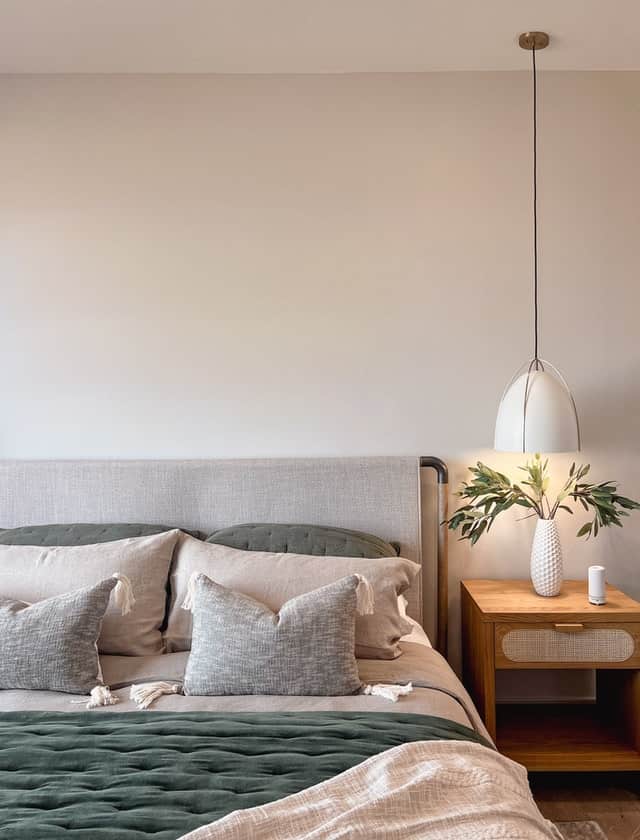
Bedroom– The bedroom is a very important space in feng shui. Because the chi energy really thrives with symmetry, you want to make sure that there is balance in this space. If you have a nightstand, you might want to consider one on either side of the bed.
Also make sure your bed is against a wall that is facing the entry door. With feng shui bed direction is important. This should give you some direction on how to organize your small bedroom. This is called the commanding position in feng shui. It gives you a sense of control and power over your space. It also allows you to see anyone coming into the room so that you can be at peace while sleeping. Finally use mirrors in this space to reflect natural light, nature, the windows. However, mirrors should not be reflecting the actual bed in this space.
Here are tips you can implement today:
DECLUTTER AND CLEAR YOUR SPACE
One of the best ways to create good apartment feng shui apartment is to start by decluttering your space. Clutter can block energy flow and make a space feel cramped and heavy.
So take some time to go through your belongings and get rid of anything you don’t need or use. Once you’ve decluttered, you can begin to arrange your furniture in a way that promotes good energy flow.
CREATE BALANCE AND SYMMETRY
Another important aspect of feng shui is creating balance and symmetry in your space. This can be achieved by arranging your furniture in a way that promotes a sense of harmony. For example, you might want to place your bed in the center of the room so that it’s equally accessible from both sides. You might also want to consider placing nightstands on either side of the bed.
Symmetry is also important in the placement of mirrors. Mirrors can be used to reflect natural light and nature, as well as to create the illusion of more space. However, you should avoid placing mirrors opposite your bed, as this can result in restless sleep.
In feng shui, each color is associated with a different element. You can use these colors to create balance in a space. Color has the ability to affect our moods and emotions, so it’s important to choose colors, particularly earthy tones, that will create a positive atmosphere in your home. For a small space, lighter colors are typically best as they help create the illusion of more space.
Feng shui colors for a small apartment:
-White: symbolizes purity and new beginnings. It’s a great color for creating a fresh start.
-Blue: promotes peace and relaxation. It’s perfect for creating a serene atmosphere in your home.
-Green: represents growth, abundance, and fertility. It’s perfect for adding a touch of
BRIGHTEN YOUR SPACE WITH NATURAL LIGHT
In feng shui, natural light represents fresh energy and new beginnings. If you’re lucky enough to have a lot of natural light in your small apartment, make sure to take advantage of it!
Open up the curtains and let the light in. You can also use mirrors to reflect light and make your space feel brighter and bigger. Place mirrors opposite of windows or near light sources to maximize their effect.
Good lighting is essential in any feng shui layout. Natural light is best, so make sure your small apartment gets plenty of sunlight. If you don’t have much natural light, you can use artificial lighting to create a bright and welcoming space.
Feng shui also dictates that every room should have a different type of lighting. For example, in the bedroom you might want to use soft, diffused lighting to create a calming atmosphere. In the kitchen, you might want to use bright overhead lighting to make cooking and prep easier.
FOCUS ON FUNCTIONALITY
When it comes to a small space, functionality is key. Feng shui is all about creating a space that supports your needs and helps you to live a more balanced and harmonious life.
So, when you’re planning your feng shui small apartment layout, make sure to focus on functionality first and foremost. Consider the way you use each space in your home and arrange your furniture accordingly. For example, if you have a home office, make sure your desk is facing the door so you can see who’s coming and going.
Additionally, furniture function is also important. Look for pieces that are inherently small space friendly like convertible furniture. A modern convertible sofa is perfect for small apartments because you can use them as both a sofa and a bed. A lift top ottoman coffee table are also great for small spaces because they provide extra seating, table and storage without taking up too much space.
By following these simple tips, good feng shui for apartments is possible! Remember to focus on decluttering, promoting good energy flow, and choosing colors and furnishings that reflect your personal style. Also the way we construct our homes directly relate to our own personal self care as we continue to live day to day in these living spaces. With a little bit of effort, you can transform your space into a haven of peace and harmony for your home and yourself.
